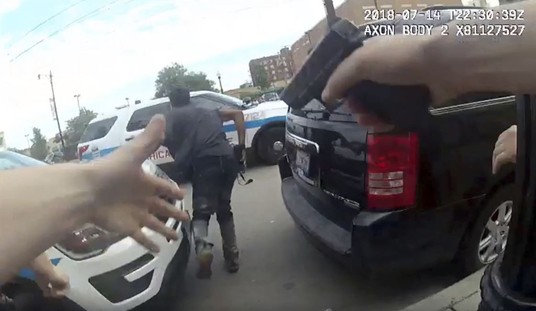If that headline reads funny to you — since when do judges recommend charges? — re-read Jazz’s post from Tuesday about the procedural quirk in Ohio law. Those who want to see the cops indicted for shooting Rice after they spotted him with a pellet gun and then failing to give first aid as he lay dying were worried that the D.A. would either undercharge or not charge at all. So, relying on an unusual statute, they petitioned the court to rule that probable court exists for the cops to be arrested on suspicion of, among other things, murder. The advisory opinion that might issue wouldn’t guarantee that the police would be charged, but it’s a brilliant ploy to pressure prosecutors. Once the judge says probable cause exists, that judgment has the authority of impartiality behind it. Now, if the D.A. still refuses to charge, it’s not just protesters who’ll be on record as disagreeing with his decision. So will a state judge.
Per the court, there’s probable cause to charge the officer who shot Rice with murder, involuntary manslaughter, reckless homicide, negligent homicide and dereliction of duty. His partner, who was driving the squad car when the fatal shot was fired from the passenger side, should face charges on the last two counts as well.


I don’t know if he had much choice on the murder charge given how broadly the statute is written: “No person shall purposely cause the death of another or the unlawful termination of another’s pregnancy.” Once you’ve concluded, as the judge did, that Rice wasn’t doing anything with his pellet gun to put the cops in fear for their lives, there’s nothing left to support self-defense. How could he not find probable cause for murder under the circumstances?
I’m curious to see how police critics react to today’s news now. An evergreen complaint in excessive-force cases is that prosecutors are reluctant to charge cops, even when someone in custody dies. That may be changing — the cop who shot Walter Scott in South Carolina was indicted this week, and you know all about Freddie Gray and the Baltimore six — but even in a case like Michael Brown’s where Darren Wilson turned out to be clearly not at fault, the long, thoughtful investigation conducted by the D.A. before deciding not to indict was something virtually no other class of defendant would receive at the indictment stage. Having succeeded now in getting a judge to nudge prosecutors in Cleveland, maybe activists’ next move will be to push for more state laws like Ohio’s authorizing citizens to file their own petitions on probable cause. They should find blue states receptive to that, at least.









Join the conversation as a VIP Member